National
Sanders, Biden and other Super Tuesday wins in California


There was something very California about it. Former Vice President Joe Biden was in Baldwin Hills delivering his victory speech live on TV after having won 10 out of 14 Super Tuesday states when a protester dashed onstage with a “Let Dairy Die” sign. Dr. Jill Biden protected her husband and a security guard quickly wrangled her away.
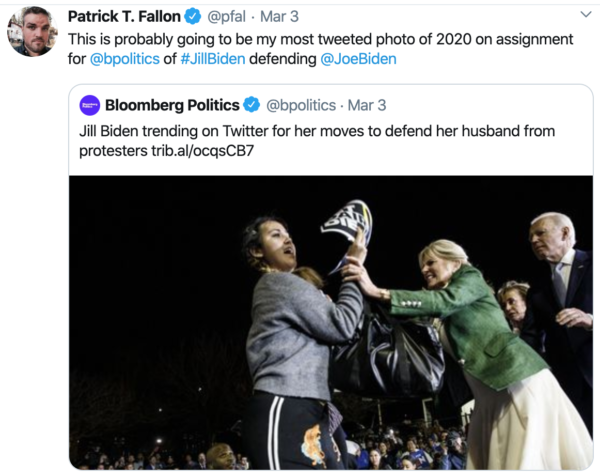
But another young woman jumped onstage, pursued by Biden spokesperson Symone D. Sanders who wrapped an arm around the protester and hauled her off as numerous women, surrounded the candidate.

The video of the incident went viral, with tweets nicknaming Sanders after Wakanda warrior General Okoye, among other superlatives. Sanders responded with a kind of snarky Lizzo brush-off moment of her own: “I broke a nail. #SuperTuesday,” she tweeted.

But the moment is an interesting Hollywood-ish metaphor for the turn of events in the race to be the Democratic Party’s presidential nominee. The 31-year-old political operative – who was a spokesperson for Sen. Bernie Sanders in 2016 before she abruptly quit – literally took an opponent off the field.
The young black millennial represents politicos and voters willing to set aside ideological purity to beat Trump. “My politics are not tied to Bernie Sanders and they are not tied to Joe Biden,” Sanders told Politico for a magazine profile last year.
“I have great respect for Senator Sanders and I have great respect and admiration for Vice President Biden. If I didn’t, I would not be working for him right now. But he does not define me.”
Sanders added that she has “never agreed 100 percent with anybody I’ve gone to work for” and she has “obviously” disagreed with Biden and even donated $250 to Pete Buttigieg. But, she told Politico, she believes Biden can win over black voters “and the Rust Belt workers who went for Trump in 2016.” She wants to tell her niece and nephew that she was “actively out there working” to get Trump out of office.
Biden’s “Joe-Mentum” started in South Carolina where the deflated once-inevitable candidate was resurrected after embarrassing defeats in Iowa, New Hampshire and a Sanders blowout in Nevada. Forty-seven percent of South Carolina voters waited for, then acted upon the Feb. 28 endorsement by House Majority Whip Jim Clyburn, the highest-ranking African American in Congress.

“I know Joe Biden. I know his character, his heart, and his record. Joe Biden has stood for the hard-working people of South Carolina. We know Joe. But more importantly, he knows us,” Clyburn tweeted. “In South Carolina, we choose presidents. I’m calling on you to stand with @JoeBiden.”
“I know where this country is: We are at an inflection point,” Clyburn said at a news conference, saying he was “fearful” for the future of this country. “It is time for us to restore this country’s dignity, this country’s respect.”
“Today people are talking about a revolution,” Biden said at that news conference. “What the country’s looking for are results. What they’re looking for is security. What they’re looking for is to be able to sustain and maintain their dignity.”
Biden won big in South Carolina but Sanders’s win in Nevada frightened many politicos worried about close down-ballot races after democratic socialist Sanders doubled down in praising the late Cuba dictator Fidel Castro, freaking out voters in Florida. Tom Steyer dropped out, as did Pete Buttigieg and Amy Klobuchar who soon endorsed Biden. Joe-Mentum before Super Tuesday was building.
And that seems to be the motivating factor that helped Biden win in Oklahoma, Minnesota, Massachusetts, Maine and Texas where Bernie Sanders was expected to do well. A huge percentage of voters said the late endorsements helped make up their minds. That seemed even more evident when, without money or organization or a grassroots ground game, Biden also swept the South with wins in Virginia, North Carolina, Alabama, Arkansas and Tennessee, thanks in large part to the huge turnout from black and women voters.

Meanwhile, Trump wasn’t waiting on Russian bots to sow discord among Democratic voters. He hugged the American flag after speaking at a CPAC conference, uttering “I love you, baby.” And he constantly tweeted about how the Establishment was stealing the nomination from Sanders, as it had in 2016, he asserted. He also tweeted at billionaire Mike Bloomberg who spent $660 million in ubiquitous ads around the country banking on a Super Tuesday strategy – with only a win in American Samoa to show for it.
Billionaires Bloomberg and Styer dropping out proved that money can’t buy the Democratic presidential nomination. California has experience with that – in 1998 when relatively moneyless Gray Davis, with strategy by Eric Bauman and the grassroots Stonewall Democratic Club, pulled out a win against millionaires Jane Harmon and Al Checchi in the June 1998 gubernatorial primary.

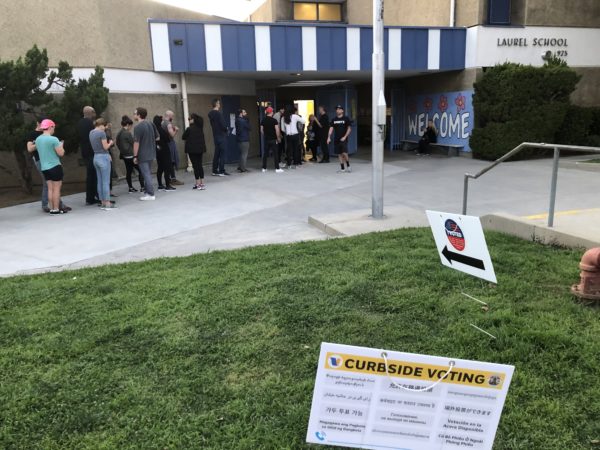
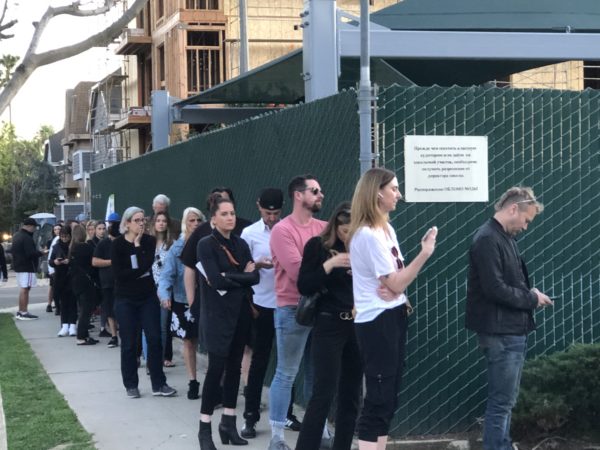
Voters in line at the Laurel Elementary School on Hayworth in West Hollywood (Photo by Karen Ocamb)
More than 1.3 million California voters turned their ballots in early by mail. But like many other regions on Super Tuesday, in-person voters in West Hollywood and around Los Angeles County experienced long lines, long wait-times and major problems with the new $300 million voting machines. When asked how long she’d been standing in line at the Laurel Elementary School on Hayworth in West Hollywood, one woman voter in her mid-30s told the Los Angeles Blade, “Since I was 21.” One of two poll workers checking in voters said the turnout had been heavy but operating the new machines was “messy.” And while the line of prospective voters snaked around the corner, the auditorium itself was empty and the machines lifeless. LA County Supervisor Janice Hahn has called for an immediate investigation into what happened.
By Thursday morning, the California Sec. of State’s office reported that of the 20,660,465 registered voters in California, only 5,521,744 ballots had been cast/counted yielding a statewide turnout of 26%. In Los Angeles, the numbers were 5,546,785 registered voters, with 1,249,137 ballots cast/counted for 22% of the vote. All the counties have until April 3 to turn in their final vote tallies.

Vermont Sen. Bernie Sanders in Los Angeles. (Photo courtesy AHF)
Sanders, registered as an independent who caucuses with the Democrats, has been campaigning in California since losing the 2016 primary to former Secretary of State Hillary Clinton. He missed the CNN LGBTQ Town Hall in LA while recuperating from his heart attack but he was the first and only presidential candidate to tour LA’s Skid Row with AIDS Healthcare Foundation President Michael Weinstein, talking about the homeless and housing crisis at AHF’s refurbished Madison Hotel on Aug. 6, 2019. He has also been a big hit with Latinos.
So it was no surprise to LA politicos that the Associated Press and other media outlets called California in Sanders’s favor, especially in anticipation of early progressive vote-by-mail results. But after Nevada and South Carolina and the moderate Buttigieg and Klobuchar endorsements – supposedly to halt Sanders from securing an insurmountable delegate count — the question became: How many delegates would the two men split going into the convention?
By mid-day March 4, the day after Super Tuesday, of the 1,991 delegates needed to win nomination, 1,215 delegates have been declared. Biden had 566 delegates; Sanders had 501. Sen. Elizabeth Warren, Bloomberg, Buttigieg, and Klobuchar had an additional 147 delegates among them. Tulsi Gabbard, who is inexplicably still in the race, had one delegate.
But by Thursday morning, March 5, it was apparent there were probably still millions of votes yet to be counted with, as Politico reported, “at least a third of the total in Los Angeles alone, with 573,000 ballots still out there, plus however many mail ballots were submitted on Election Day.” And it is still a long way until the July 13-16 Democratic Party Convention in Milwaukee, Wis.
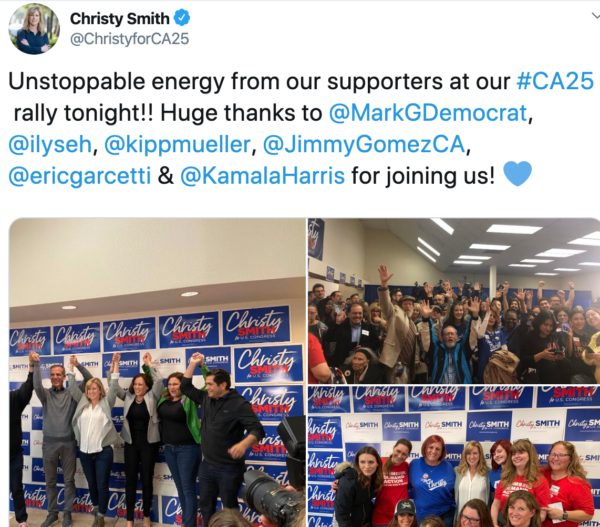
Meanwhile, Super Tuesday in California yielded a number of successful down-ballot primary races. LGBTQ ally Assemblymember Christy Smith left snarky Young Turks sexist homophobe Cenk Uygur in the dust in the CA-25 district race to fill the congressional seat vacated by bisexual Rep. Katie Hill. Longtime anti-LGBTQ former Rep. Steve Knight, who Hill defeated, clawed his way to second place behind GOP Mike Garcia in trying to challenge Smith in both a special May 12 runoff to fill six months left on Hill’s time and in the November general election for the seat outright. Former Trump staffer George Papadopoulos barely made a mark.

In another much-watched contest in the CA-50 district, Democrat Ammar Campa-Najjar, who was maliciously reviled in his previous race against disgraced (now convicted) Rep. Duncan Hunter, is sitting back watching gay San Diego talk show host Carl DeMaio slug it out with anti-LGBTQ former Rep. Darrel Issa in the who-is-best-for-Trump Republican match.
In a nail-biting state legislative race, with thousands of ballots still to be counted in the highly contested Senate District 5 race, it looks like out Assemblymember Susan Talamantes Eggman (D-Stockton) is in first place ahead of Republican Jim Ridenour and will advance to the November general election. The sweet spin is that the lesbian beat anti-LGBTQ Democrat Mani Grewal.
“If Eggman wins in November, she will make history as the first openly LGBTQ+ woman of color to serve in the California Senate — potentially alongside Abigail Medina, who is running in Senate District 23,” says a press release from Equality California.
“Susan Talamantes Eggman is the champion that Central Valley Voters want and deserve fighting for them in Sacramento. We are proud to support Susan’s campaign because we know she’ll roll up her sleeves and tackle homelessness, veterans’ issues and LGBTQ+ civil rights,” says Equality California Executive Director Rick Chavez Zbur. “We’re confident Susan will win in November, and we’ll be with her every step of the way.”
In the San Diego area race for the CA-53, it looks like lesbian Georgette Gomez, who could become the first openly LGBTQ Latinx member of Congress, will be in a run-off with longtime LGBTQ ally Sara Jacobs. There is still a 30-day window before all the votes are tallied but the two women are the top vote-getters in a crowded field of 15 candidates.
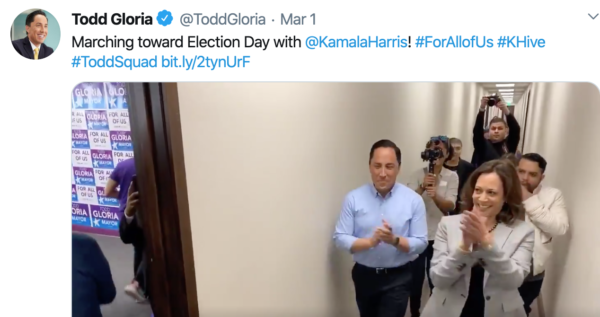
And it looks like out Assemblymember Todd Gloria is likely to become the next Mayor of San Diego.
On the local LA County level, it looks like a run-off between LA City Council President Herb Wesson and State Sen. Holly Mitchell for the 2nd Supervisor seat being vacated by Mark Ridley-Thomas, who appears to have won his City Council race in the 10th district. As did longtime LGBTQ ally Kevin De Leon in the 14th district. Longtime out LGBTQ and HIV/AIDS activist Eddie Martinez has made the run-off for Huntington Park City Council.
And incumbent District Attorney Jackie Lacey is just over 50%, which, if it holds, means that she’s defeated an intense effort by progressive prosecutors George Gascon and Rachel Rossi to oust her and institute deeper judicial reforms.
Two very special races of note: longtime LGBTQ politico Jackie Goldberg won her reelection bid to the LA Unified School Board, despite vicious attacks by her charter school-supporting opponents. And lesbian Deputy DA Sherry Powell won her totally grassroots contest for Superior Court Judge Office No. 97 outright – beating rich attorney Timothy Reuben 64% to 36%.

The primaries aren’t over yet, of course, and there are ample opportunities for Biden to stumble, Sanders to recover and Massachusetts Sen. Elizabeth Warren to play a major role after her withdrawal on Thursday.
And, as Washington Blade Political Correspondent Chris Johnson described in his report, there is still plenty of room for LGBTQ voters to have an even bigger impact.

“Hopefully her historic candidacy will get the attention and credibility it deserves,” longtime out Latina politico Ari Guttierez tells the Los Angeles Blade after she and her 9-year old daughter Emma Arámbula met Warren in the heart of East Los Angeles.
And what role will former Mayor Pete Buttigieg play after Biden wistfully compared him to his own late son Bo Biden, the former Attorney General for Delaware.
“We sent a message,” Buttigieg, 38, said, “to every kid out there wondering if whatever marks them out as different means they are somehow destined to be less than, to see that someone who once felt that exact same way can become a leading American presidential candidate with his husband at his side.”
Chad Griffin, former president of the Human Rights Campaign, cast his ballot for Biden, a man he has long known. “America needs a leader in the White House who can help us navigate the tremendous challenges we’re facing on all front – someone who has a tested record of success, and an enlightened vision for the future to guide this nation back onto the path of progress,” Griffin said in a statement posted to Twitter. “I’m proud to endorse him and will fight like hell to get him elected.”
It was Griffin who enlightened Biden about marriage equality.
Anti-gay marriage Prop 8 was on everyone’s mind as President Barack Obama faced reelection in 2012. Obama campaign advisors David Axelrod and David Plouffe reached out to gay GOP strategist Ken Mehlman, former chair of the Republican National Committee who engineered President George W. Bush’s re-election in 2004, for advice since Mehlman was part a Griffin-created federal challenge to Prop 8. But while almost everyone was on board with Obama coming out in favor of marriage equality before the election, including Michelle Obama, nothing happened.
As Pulitzer Prize-winning New York Times investigative reporter Jo Becker put it in her monumental book on Prop 8, “Forcing the Spring: Inside the Fight for Marriage Equality,” Griffin felt bans like Prop 8 “sent a signal that there was something inherently wrong with gay men and lesbians” and permitted state sanctioned bullying and anti-LGBTQ laws. He’d asked Obama if there was anything he could do to help him “evolve” more quickly – especially since the pro-Prop 8 side wanted to use Obama’s opposition to their advantage. But the president put him off.
Then, on April 19, 2012, Griffin attended a gay Democratic fundraiser he’d helped put together at Obama’s request at the home of Michael Lombardo, an HBO executive, and his husband, Sonny Ward, an architect. He wanted to ask Biden, the guest of honor, directly about marriage equality but he knew the answer.
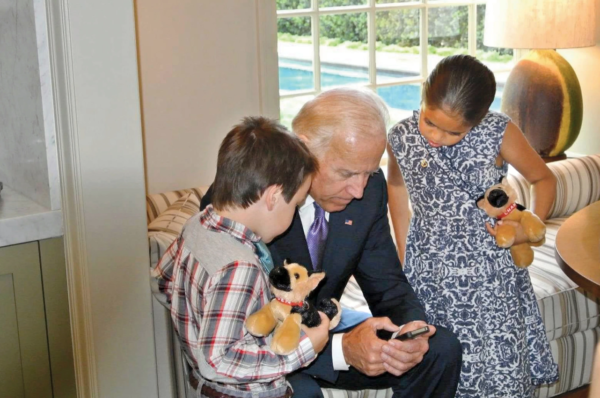
Vice President Joe Biden with Johnny and Josie Ward-Lombardo at a party at the home of their parents, Sonny Ward and Michael Lombardo, in 2012. (Photo courtesy Michael Lombardo)
“But as he watched the hosts’ two children, ages 5 and 7, press flowers and a note into Biden’s hand, he changed his mind,” Becker writes in an excerpt for the New York Times. “They were in the home of two married men and their family. The Obama campaign wanted the support of the gay people in this room. The vice president should have to answer to them. When it was Griffin’s turn to speak, he said: ‘When you came in tonight, you met Michael and Sonny and their two beautiful kids. And I wonder if you can just sort of talk in a frank, honest way about your own personal views as it relates to equality, but specifically as it relates to marriage equality.’”
Biden was clearly uncomfortable – he had sided with Obama in the issue. But then he totally surprised everyone.
“’I look at those two beautiful kids,’ Biden began,” Becker reports. “‘I wish everybody could see this. All you got to do is look in the eyes of those kids. And no one can wonder, no one can wonder whether or not they are cared for and nurtured and loved and reinforced. And folks, what’s happening is, everybody is beginning to see it.
‘Things are changing so rapidly, it’s going to become a political liability in the near term for an individual to say, ‘I oppose gay marriage.’ Mark my words.’”
Apparently, a dam had broken because Biden didn’t stop, asking aloud, what’s the problem?
“’And my job — our job — is to keep this momentum rolling to the inevitable,’” Biden said, stunning everyone in the room.
And he did keep the momentum going, appearing on NBC’s “Meet the Press” and answering the question directly and authentically.
“I am absolutely comfortable with the fact that men marrying men, women marrying women and heterosexual men and women marrying one another are entitled to the same exact rights, all the civil rights, all the civil liberties,” Biden said, noting that Obama, not Biden, sets policy.
But the cosmos had changed and the Obama camp wasn’t happy. “He probably got out a little bit over his skis, but out of generosity of spirit,” Obama said, as if it was another Biden-ism. But shortly thereafter, Obama formally, if stiffly, came out in favor of marriage equality.
And in his Inaugural Address on Jan. 21, 2013, Becker reports, “Obama drew a straight line from the civil rights fights based on race and gender to the current struggle for marriage equality.
‘Our journey is not complete until our gay brothers and sisters are treated like anyone else under the law,’ the president said, ‘for if we are truly created equal, then surely the love we commit to one another must be equal as well.’”
On Thursday, Biden released an extensive plan on LGBTQ rights. “Joe Biden is a man of uncommon decency and integrity and heart,” Michael Lombardo tells the Los Angeles Blade.
And perhaps, if Biden becomes the Democratic presidential nominee, he will use that decency as a tool in the 2020 election fight against profoundly indecent Donald Trump, with an assist from Wakanda coalition builder, Symone D. Sanders.
U.S. Supreme Court
Competing rallies draw hundreds to Supreme Court
Activists, politicians gather during oral arguments over trans youth participation in sports

Hundreds of supporters and opponents of trans rights gathered outside of the United States Supreme Court during oral arguments for Little v. Hecox and West Virginia v. B.P.J. on Tuesday. Two competing rallies were held next to each other, with politicians and opposing movement leaders at each.
“Trans rights are human rights!” proclaimed U.S. Sen. Ed Markey (D-Mass.) to the crowd of LGBTQ rights supporters. “I am here today because trans kids deserve more than to be debated on cable news. They deserve joy. They deserve support. They deserve to grow up knowing that their country has their back.”

“And I am here today because we have been down this hateful road before,” Markey continued. “We have seen time and time again what happens when the courts are asked to uphold discrimination. History eventually corrects those mistakes, but only after the real harm is done to human beings.”
View on Threads
U.S. Education Secretary Linda McMahon spoke at the other podium set up a few feet away surrounded by signs, “Two Sexes. One Truth.” and “Reality Matters. Biology Matters.”
“In just four years, the Biden administration reversed decades of progress,” said McMahon. “twisting the law to urge that sex is not defined by objective biological reality, but by subjective notion of gender identity. We’ve seen the consequences of the Biden administration’s advocacy of transgender agendas.”

U.S. Rep. Mark Takano (D-Calif.), chair of the Congressional Equality Caucus, was introduced on the opposing podium during McMahon’s remarks.
“This court, whose building that we stand before this morning, did something quite remarkable 6 years ago.” Takano said. “It did the humanely decent thing, and legally correct thing. In the Bostock decision, the Supreme Court said that trans employees exist. It said that trans employees matter. It said that Title VII of the Civil Rights Act protects employees from discrimination based on sex, and that discrimination based on sex includes discrimination based on gender identity and sexual orientation. It recognizes that trans people have workplace rights and that their livelihoods cannot be denied to them, because of who they are as trans people.”
“Today, we ask this court to be consistent,” Takano continued. “If trans employees exist, surely trans teenagers exist. If trans teenagers exist, surely trans children exist. If trans employees have a right not to be discriminated against in the workplace, trans kids have a right to a free and equal education in school.”
Takano then turned and pointed his finger toward McMahon.
“Did you hear that, Secretary McMahon?” Takano addressed McMahon. “Trans kids have a right to a free and equal education! Restore the Office of Civil Rights! Did you hear me Secretary McMahon? You will not speak louder or speak over me or over these people.”
Both politicians continued their remarks from opposing podiums.
“I end with a message to trans youth who need to know that there are adults who reject the political weaponization of hate and bigotry,” Takano said. “To you, I say: you matter. You are not alone. Discrimination has no place in our schools. It has no place in our laws, and it has no place in America.”
U.S. Supreme Court
Supreme Court hears arguments in two critical cases on trans sports bans
Justices considered whether laws unconstitutional under Title IX

The Supreme Court heard two cases today that could change how the Equal Protection Clause and Title IX are enforced.
The cases, Little v. Hecox and West Virginia v. B.P.J., ask the court to determine whether state laws blocking transgender girls from participating on girls’ teams at publicly funded schools violates the 14th Amendment’s Equal Protection Clause and Title IX. Once decided, the rulings could reshape how laws addressing sex discrimination are interpreted nationwide.
Chief Justice John Roberts raised questions about whether Bostock v. Clayton County — the landmark case holding that Title VII of the Civil Rights Act of 1964 protects employees from discrimination based on sexual orientation or gender identity — applies in the context of athletics. He questioned whether transgender girls should be considered girls under the law, noting that they were assigned male at birth.
“I think the basic focus of the discussion up until now, which is, as I see it anyway, whether or not we should view your position as a challenge to the distinction between boys and girls on the basis of sex or whether or not you are perfectly comfortable with the distinction between boys and girls, you just want an exception to the biological definition of girls.”
“How we approach the situation of looking at it not as boys versus girls but whether or not there should be an exception with respect to the definition of girls,” Roberts added, suggesting the implications could extend beyond athletics. “That would — if we adopted that, that would have to apply across the board and not simply to the area of athletics.”
Justice Clarence Thomas echoed Roberts’ concerns, questioning how sex-based classifications function under Title IX and what would happen if Idaho’s ban were struck down.
“Does a — the justification for a classification as you have in Title IX, male/female sports, let’s take, for example, an individual male who is not a good athlete, say, a lousy tennis player, and does not make the women’s — and wants to try out for the women’s tennis team, and he said there is no way I’m better than the women’s tennis players. How is that different from what you’re being required to do here?”
Justice Samuel Alito addressed what many in the courtroom seemed reluctant to state directly: the legal definition of sex.
“Under Title IX, what does the term ‘sex’ mean?” Alito asked Principal Deputy Solicitor General Hashim Mooppan, who was arguing in support of Idaho’s law. Mooppan maintained that sex should be defined at birth.
“We think it’s properly interpreted pursuant to its ordinary traditional definition of biological sex and think probably given the time it was enacted, reproductive biology is probably the best way of understanding that,” Mooppan said.
Justice Sonia Sotomayor pushed back, questioning how that definition did not amount to sex discrimination against Lindsay Hecox under Idaho law. If Hecox’s sex is legally defined as male, Sotomayor argued, the exclusion still creates discrimination.
“It’s still an exception,” Sotomayor said. “It’s a subclass of people who are covered by the law and others are not.”
Justice Elena Kagan highlighted the broader implications of the cases, asking whether a ruling for the states would impose a single definition of sex on the 23 states that currently have different laws and standards. The parties acknowledged that scientific research does not yet offer a clear consensus on sex.
“I think the one thing we definitely want to have is complete findings. So that’s why we really were urging to have a full record developed before there were a final judgment of scientific uncertainty,” said Kathleen Harnett, Hecox’s legal representative. “Maybe on a later record, that would come out differently — but I don’t think that — ”

“Just play it out a little bit, if there were scientific uncertainty,” Kagan responded.
Justice Brett Kavanaugh focused on the impact such policies could have on cisgender girls, arguing that allowing transgender girls to compete could undermine Title IX’s original purpose.
“For the individual girl who does not make the team or doesn’t get on the stand for the medal or doesn’t make all league, there’s a — there’s a harm there,” Kavanaugh said. “I think we can’t sweep that aside.”
Justice Amy Coney Barrett questioned whether Idaho’s law discriminated based on transgender status or sex.
“Since trans boys can play on boys’ teams, how would we say this discriminates on the basis of transgender status when its effect really only runs towards trans girls and not trans boys?”
Harnett responded, “I think that might be relevant to a, for example, animus point, right, that we’re not a complete exclusion of transgender people. There was an exclusion of transgender women.”
Justice Ketanji Brown Jackson challenged the notion that explicitly excluding transgender people was not discrimination.
“I guess I’m struggling to understand how you can say that this law doesn’t discriminate on the basis of transgender status. The law expressly aims to ensure that transgender women can’t play on women’s sports teams… it treats transgender women different than — than cis-women, doesn’t it?”
Idaho Solicitor General Alan Hurst urged the court to uphold his state’s ban, arguing that allowing participation based on gender identity — regardless of medical intervention — would deny opportunities to girls protected under federal law.
Hurst emphasized that biological “sex is what matters in sports,” not gender identity, citing scientific evidence that people assigned male at birth are predisposed to athletic advantages.
Joshua Block, representing B.P.J., was asked whether a ruling in their favor would redefine sex under federal law.
“I don’t think the purpose of Title IX is to have an accurate definition of sex,” Block said. “I think the purpose is to make sure sex isn’t being used to deny opportunities.”
Becky Pepper-Jackson, identified as plaintiff B.P.J., the 15-year-old also spoke out.
“I play for my school for the same reason other kids on my track team do — to make friends, have fun, and challenge myself through practice and teamwork,” said Pepper-Jackson. “And all I’ve ever wanted was the same opportunities as my peers. But in 2021, politicians in my state passed a law banning me — the only transgender student athlete in the entire state — from playing as who I really am. This is unfair to me and every transgender kid who just wants the freedom to be themselves.”

Outside the court, advocates echoed those concerns as the justices deliberated.
“Becky simply wants to be with her teammates on the track and field team, to experience the camaraderie and many documented benefits of participating in team sports,” said Sasha Buchert, counsel and Nonbinary & Transgender Rights Project director at Lambda Legal. “It has been amply proven that participating in team sports equips youth with a myriad of skills — in leadership, teamwork, confidence, and health. On the other hand, denying a student the ability to participate is not only discriminatory but harmful to a student’s self-esteem, sending a message that they are not good enough and deserve to be excluded. That is the argument we made today and that we hope resonated with the justices of the Supreme Court.”
“This case is about the ability of transgender youth like Becky to participate in our schools and communities,” said Joshua Block, senior counsel for the ACLU’s LGBTQ & HIV Project. “School athletics are fundamentally educational programs, but West Virginia’s law completely excluded Becky from her school’s entire athletic program even when there is no connection to alleged concerns about fairness or safety. As the lower court recognized, forcing Becky to either give up sports or play on the boys’ team — in contradiction of who she is at school, at home, and across her life — is really no choice at all. We are glad to stand with her and her family to defend her rights, and the rights of every young person, to be included as a member of their school community, at the Supreme Court.”
The Supreme Court is expected to issue rulings in both cases by the end of June.
Minnesota
Reports say woman killed by ICE was part of LGBTQ community
Renee Nicole Good shot in Minneapolis on Wednesday

A U.S. Immigration and Customs Enforcement agent shot and killed a woman in Minneapolis as she attempted to drive away from law enforcement during a protest on Wednesday.
The Star Tribune newspaper identified the victim as Renee Nicole Good, 37, a Minneapolis resident who lived blocks from where she was shot in the Central neighborhood, according to reports. Donna Ganger, Good’s mother, told the Star Tribune that her daughter lived in the Twin Cities with her wife.
Multiple videos of the shooting have gone viral on social media, showing various angles of the fatal incident — including footage that shows Good getting into her car and attempting to drive away from law enforcement officers, who had their weapons drawn.
In the videos, ICE agents can be heard telling Good to “get out of the fucking car” as they attempted to arrest her. Good, who press reports say was married to a woman, ended up crashing her car into an electric pole and other vehicles. She was later transported from the scene of the shooting and died at the hospital.
President Donald Trump defended the ICE agent on Truth Social, saying the officer was “viciously” run over — a claim that coincides with Homeland Security Secretary Kristi Noem’s assessment of the situation. Noem, a South Dakota Republican, insisted the officer “fired defensive shots” at Good after she attempted to run over law enforcement agents “in an attempt to kill them — an act of domestic terrorism.”
Multiple state and local officials disputed claims that the shooting was carried out in self-defense at the same time Noem was making those assertions.
An Instagram account that appears to belong to Good describes her as a “poet and writer and wife and mom and shitty guitar strummer from Colorado; experiencing Minneapolis, MN,” accompanied by a rainbow flag emoji.
A video posted to X after the shooting shows a woman, reportedly her wife, sitting on the ground, crying and saying, “They killed my wife. I don’t know what to do.”
“We’ve dreaded this moment since the early stages of this ICE presence in Minneapolis,” Mayor Jacob Frey said during a Wednesday press conference. “Having seen the video myself, I want to tell everybody directly that [the DHS’s claim of self-defense] is bullshit. This was an agent recklessly using power that resulted in somebody dying, getting killed.”
“I have a message for ICE. To ICE, get the fuck out of Minneapolis,” Frey continued. “We do not want you here. Your stated reason for being in this city is to create some kind of safety, and you are doing exactly the opposite. People are being hurt. Families are being ripped apart. Long-term Minneapolis residents that have contributed so greatly to our city, to our culture, to our economy are being terrorized, and now somebody is dead. That’s on you, and it’s also on you to leave.”
Across the Capitol, members of the House and the Senate condemned the actions of the officer.
“There’s no indication she’s a protester, there’s nothing that at least you can see on the video, and therefore nothing that the officers on the ground could see that identify her as someone who’s set out to try to do harm to an ICE officer,” U.S. Sen. Elizabeth Warren (D-Mass.) said Wednesday night on MS NOW’s “The Weeknight.”
“There is no evidence that has been presented to justify this killing,” House Minority Leader Hakeem Jeffries (D-N.Y.) said in a statement on his website. “The masked ICE agent who pulled the trigger should be criminally investigated to the full extent of the law for acting with depraved indifference to human life.”
“ICE just killed someone in Minneapolis,” U.S. Rep. Robert Garcia (D-Calif.) the highest-ranking Democrat on the House Oversight Committee, posted on X. “This administration’s violence against communities across our country is horrific and dangerous. Oversight Democrats are demanding answers on what happened today. We need an investigation immediately.”
In a statement to the Advocate, Human Rights Campaign President Kelley Robinson wrote, “Today, a woman was senselessly killed in Minneapolis during an ICE action — a brutal reminder that this agency and the Trump regime put every community at risk, spreading fear instead of safety. Reports that she may have been part of the LGBTQ+ community underscore how often the most vulnerable pay the highest price.”
National LGBTQ Task Force President Kierra Johnson also responded to Good’s death.
“We recognize and mourn the loss of Renee Nicole Good and extend our condolences to her family, loved ones, and community,” said Johnson in a statement. “This loss of life was preventable and reprehensible, particularly coming at the hands of federal agents.”
National
Top 10 LGBTQ national news stories of 2025
Trump, Supreme Court mount cruel attacks against trans community

President Trump’s anti-LGBTQ agenda dominated national news in 2025, particularly his cruel attacks on trans Americans. Here are our picks for the top 10 LGBTQ news stories the Blade covered in 2025.
10. Trump grants clemency to George Santos

President Donald Trump granted clemency to disgraced former Long Island Rep. George Santos. Santos was sentenced to 87 months in federal prison after pleading guilty to wire fraud and aggravated identity theft and had served just 84 days of his more than seven-year sentence. He lied to both the DOJ and the House Ethics Committee, including about his work and education history, and committed campaign finance fraud.
9. U.S. Olympics bans trans women athletes
The United States Supreme Court decided in 2025 to take up two cases — Little v. Hecox and West Virginia v. B.P.J.— both of which concern the rights of transgender athletes to participate on sports teams. The cases challenge state laws under the Equal Protection Clause of the 14th Amendment, which prevents states from offering separate boys’ and girls’ sports teams based on biological sex determined at birth. Both cases are set to be heard in January 2026. The developments follow a decision by the United States Olympic & Paralympic Committee to change eligibility rules to prohibit transgender women from competing in women’s sporting events on behalf of the United States, following Trump’s Executive Order 14201, “Keeping Men Out of Women’s Sports.”
8. FDA approves new twice-yearly HIV prevention drug
The U.S. Food and Drug Administration on June 18 approved a newly developed HIV/AIDS prevention drug that needs to be taken only twice a year, with one injection every six months. The new drug, lenacapavir, is being sold under the brand name Yeztugo by pharmaceutical company Gilead Sciences. According to trial data, 99.9 percent of participants who received Yeztugo remained HIV negative. This emerging technology comes amid direct cuts to HIV/AIDS research measures by the Trump–Vance administration, particularly targeting international HIV efforts such as PEPFAR.
7. LGBTQ people ‘erased’ from gov’t reports
Politico reported in March that the Trump–Vance administration is slashing the State Department’s annual human rights report, cutting sections related to the rights of women, people with disabilities, the LGBTQ+ community, and more. Members of Congress objected to the removal of the subsection on “Acts of Violence, Criminalization, and Other Abuses Based on Sexual Orientation, Gender Identity or Expression, or Sex Characteristics (SOGIESC)” from the State Department’s Annual Country Reports on Human Rights Practices.
In a Sept. 9 letter to Secretary of State Marco Rubio, U.S. Reps. Robert Garcia (D-Calif.), Julie Johnson (D-Texas), and Sarah McBride (D-Del.) urged the department to restore the information or ensure it is integrated throughout each report, noting that the reports serve as key evidence for asylum seekers, attorneys, judges, and advocates assessing human rights conditions and protection claims worldwide.
6. Trump admin redefines ‘sex’ in all HHS programs

The Trump administration canceled more than $800 million in research into the health of sexual and gender minority groups. More than half of the National Institutes of Health grants scrapped through early May involved studies of cancers and viruses that disproportionately affect LGBTQ people.
The administration is also pushing to end gender-affirming care for transgender youth, according to a new proposal from the Department of Health and Human Services, NPR reported. The administration is considering blocking all Medicaid and Medicare funding for services at hospitals that provide pediatric gender-affirming care. “These rules would be a significant escalation in the Trump administration’s attack on access to transgender health care,” said Katie Keith, director of the Center for Health Policy and Law at Georgetown University.
5. FBI plans to label trans people as ‘violent extremists’
The Human Rights Campaign, Transgender Law Center, Equality Federation, GLAAD, PFLAG, and the Southern Poverty Law Center condemned reports that the FBI, in coordination with the Heritage Foundation, may be working to designate transgender people as “violent extremists.” The concerns followed a report earlier this month by independent journalist Ken Klippenstein, who cited two anonymous national security officials saying the FBI is considering treating transgender subjects as a subset of a new threat category.
That classification—originally created under the Biden administration as “Anti-Authority and Anti-Government Violent Extremists” (AGAAVE) — was first applied to Jan. 6 rioters and other right-wing extremists. Advocates said the proposal appears to stem from the false claim that the assassination of Charlie Kirk was committed by a transgender person.
4. Pentagon targets LGBTQ service members

Acting in agreement with the growing anti-LGBTQ sentiment from the Trump administration, during a televised speech to U.S. military leaders at Marine Corps Base Quantico in late September, Defense Secretary Pete Hegseth denounced past military leadership for being too “woke,” citing DEI initiatives and LGBTQ inclusion within the Department of Defense. During the 45-minute address, Hegseth criticized inclusive policies and announced forthcoming directives, saying they would ensure combat requirements “return to the highest male standard only.”
Since 2016, a Navy replenishment oiler had borne the name of gay rights icon Harvey Milk, who served in the Navy during the Korean War and was separated from service under other than honorable conditions due to his sexuality before later becoming one of the first openly LGBTQ candidates elected to public office. In June 2025, the ship was renamed USNS Oscar V. Peterson.
The U.S. Air Force also announced that transgender service members who have served between 15 and 18 years would be denied early retirement and instead separated from the military without benefits. Transgender troops will be given the option of accepting a lump-sum payout offered to junior service members or being removed from service.
In February, the Pentagon said it would draft and submit procedures to identify transgender service members and begin discharging them from the military within 30 days.
3. Trump blames Democrats, trans people for gov’t shutdown
Republicans failed to reach an agreement with Democrats and blamed them for the government shutdown, while Democrats pointed to Republicans for cutting health care tax credits, a move they said would result in millions of people paying significantly higher monthly insurance premiums next year. In the White House press briefing room, a video of Democrats discussing past government shutdowns played on a loop as the president continued to blame the Democratic Party and “woke” issues, including transgender people.
“A lot of good can come from shutdowns. We can get rid of a lot of things. They’d be Democrat things,” Trump said the night before the shutdown. “They want open borders. Men playing in women’s sports. They want transgender for everybody.”
2. Supreme Court joins attacks on LGBTQ Americans

The U.S. Supreme Court issued multiple rulings this year affecting LGBTQ people. In Mahmoud v. Taylor (6–3), it ruled that public schools must give parents advance notice and the option to opt children out of lessons on gender or sexuality that conflict with their religious beliefs. The case arose after Montgomery County, Md., schools added LGBTQ-inclusive storybooks to the elementary curriculum.
In June, the court upheld Tennessee’s ban on gender-affirming care for transgender minors, protecting similar laws in more than 20 states. Lawmakers and advocates criticized the ruling, and a coalition of seven medical associations warned it strips families of the right to direct their own health care.
The Court also allowed the Trump administration to enforce a ban on transgender military personnel and to implement a policy blocking passports with “X” gender markers, with the federal government recognizing only male and female designations.
1. Trump inaugurated for second time
President Donald Trump became the 47th president after winning Wisconsin, securing 277 of the 270 electoral votes needed. His guidebook, Project 2025, outlined the Republican Party’s goals under his new leadership, with a particular focus on opposing transgender rights.
Trump nominated openly gay hedge fund executive Scott Bessent as U.S. Treasury Secretary, a role he eventually assumed. Bessent became the highest-ranking openly gay U.S. government official in American history.

Honorable mention: The war on rainbow crosswalks escalates around the country
Florida Gov. Ron DeSantis (R) ordered state transportation officials to remove a rainbow-colored crosswalk in Orlando next to the Pulse gay nightclub, where 49 mostly LGBTQ people were killed in a 2016 mass shooting. The move follows a July 1, 2025, announcement by U.S. Transportation Secretary Sean Duffy that, with support from President Trump, the department adopted a “nationwide roadway safety initiative” that political observers say could be used to require cities and states to remove rainbow street crosswalks.
Crime & Justice
San Fernando Valley LGBTQ+ community center Somos Familia Valle is trying to rebuild from a “traumatizing” break-in
This Monday, burglars stole $8,000 worth of essential materials from the organization.

In the early hours of Monday morning, burglars broke through three walls of the Sun Valley LGBTQ+ community center Somos Familia Valle. They rummaged through two main rooms and left with $8,000 worth of technology: 15 Chromebooks, two iPads, a camera, two microphones, and a large audio system that staff members used to host programs like Queer Yoga and Vogue Classes. “I was scared because I was wondering if it was a hate thing,” said Somos Familia Valle co-founder and president Kevin Al Perez.
Perez had woken that day with his usual routine of checking the building’s cameras and Wi-Fi systems remotely. Suddenly, he jolted after noticing they’d been turned off for hours. Since he was away, he asked his father to check on the space. “Everything’s fine,” his father replied, who said that the main door looked untouched.
After stepping inside, the damage became clear. Pieces of walls were torn out and strewn across the floor, items were hastily tossed aside, and the technology normally utilized for the center’s phone banking program, fitness classes, and community workshops were missing. “This is our first space,” Perez told the Blade, noting how devastating this break-in has been, both physically and mentally, for himself and his community members.
Somos Familia Valle began as a grassroots movement in 2014, when Perez and other LGBTQ+ locals noticed the absence of a Pride parade in the San Fernando Valley. Together, they organized a vibrant, joyous celebration of queer identity, planting the roots of what is now an intersectional space that uplifts and pours into the Valley’s diverse residents. For nearly a decade, they hosted programs at other community spaces, such as the Sherman Oaks East Valley Adult Center, before moving into their brick-and-mortar location on Sheldon Street.
With this physical space, Perez and Somos Familia Valle’s community organizer, Damiana Cano, have evolved that core mission with new branches. It is important for them to not only prioritize queer education and empowerment but also voter engagement mobilization, know your rights workshops, computer literacy classes, and physical health programs to fuel the safety and strength of people who seek support from the center.
“As someone who was born and raised in this community, I think it is so fulfilling and beautiful that LGBTQ people of all generations have a safe space to come together and create beautiful art here in the Northeast SFV,” Cano wrote to the Blade. “Over time, this…became more than a community; these people are my family.”
In response to the break-in, the community has stepped up. Perez opened a GoFundMe campaign, and within three days, it has surpassed its initial $8,000 goal. Right after the break-in, the center halted all programming. Now, with this wave of support, Perez says that these offerings, which include a TGI support group, mental health task force, Pride committee, and Queer Country will likely resume in January.
Somos Familia Valle will also move forward with their upcoming “Queer Together” holiday party, which will be held at their center on Sheldon Street. Perez told the Blade that the walls have been repaired, and he is determined to honor the resilience of the center and the people it serves. “It’s heartbreaking and traumatizing [but] they’re not going to take that away from us,” Perez said.
The break-in is currently under investigation by local law enforcement agents. To support Somos Familia Valle, their GoFundMe campaign is linked here.
Kristie Song is a California Local News Fellow placed with the Los Angeles Blade. The California Local News Fellowship is a state-funded initiative to support and strengthen local news reporting. Learn more about it at fellowships.journalism.berkeley.edu/cafellows.
National
As house Democrats release Epstein photos, Garcia continues to demand DOJ transparency
Blade this week sat down with gay House Oversight Committee ranking member

Democrats on the House Oversight Committee have released new photos from Jeffrey Epstein’s email and computer records, including images highlighting the relationship between President Donald Trump and the convicted sex offender.
Epstein, a wealthy financier, was found guilty of procuring a child for prostitution and sex trafficking, serving a 13-month prison sentence in 2008. At the time of his death in prison under mysterious circumstances, he was facing charges of sex trafficking and conspiracy to traffic minors.
Among those pictured in Epstein’s digital files are Trump, former President Bill Clinton, former Trump adviser Steve Bannon, actor and director Woody Allen, economist Larry Summers, lawyer Alan Dershowitz, entrepreneurs Richard Branson and Bill Gates, and Andrew Mountbatten-Windsor.
One photo shows Trump alongside Epstein and a woman at a Victoria’s Secret party in New York in 1997. American media outlets have published the image, while Getty Images identified the woman as model Ingrid Seynhaeve.
Oversight Committee Democrats are reviewing the full set of photos and plan to release additional images to the public in the coming days and weeks, emphasizing their commitment to protecting survivors’ identities.
With just a week left for the Justice Department to publish all files related to Epstein following the passage of the Epstein Files Transparency Act, which requires the Justice Department to release most records connected to Epstein investigations, the Washington Blade sat down with U.S. Rep. Robert Garcia (D-Calif.), the ranking member on the Oversight Committee to discuss the current push the release of more documents.
Garcia highlighted the committee’s commitment to transparency and accountability.

“We’ve said anything that we get we’re going to put out. We don’t care who is in the files … if you’ve harmed women and girls, then we’ve got to hold you accountable.”
He noted ongoing questions surrounding Trump’s relationship with Epstein, given their long history and the apparent break in friendship once Trump assumed public office.
“There’s been a lot of questions about … Donald Trump and Jeffrey Epstein. They were best friends for 10 years … met women there and girls.”
Prior to Trump’s presidency, it was widely reported that the two were friends who visited each other’s properties regularly. Additional reporting shows they socialized frequently throughout the 1990s and early 2000s, attending parties at Trump’s Mar-a-Lago resort in Florida and Epstein’s residences. Flight logs from an associate’s trial indicate Trump flew on Epstein’s private jet multiple times, and Epstein claimed Trump first had sex with his future wife, Melania Knauss, aboard the jet.
“We’ve provided evidence … [that leads to] questions about what the relationship was like between Donald Trump and Jeffrey Epstein.”
Garcia stressed the need for answers regarding the White House’s role in withholding information, questioning the sudden change in attitude toward releasing the files given Trump’s campaign promises.
“Why is the White House trying to cover this up? So if he’s not covering for himself … he’s covering up for his rich friends,” Garcia said. “Why the cover up? Who are you hiding for? I think that’s the question.”
He confirmed that Trump is definitively in the Epstein files, though the extent remains unknown, but will be uncovered soon.
“We know that Trump’s in them. Yeah, he’s been told. We know that Trump’s in them in some way. As far as the extent of it … we don’t know.”
Garcia emphasized accountability for all powerful figures implicated, regardless of financial status, political party, or personal connections.
“All these powerful men that are walking around right now … after abusing, in some cases, 14‑ and 15‑year‑old girls, they have to be held accountable,” he said. “There has to be justice for those survivors and the American public deserves the truth about who was involved in that.”
He added that while he is the ranking member, he will ensure the oversight committee will use all available political tools, including subpoenas — potentially even for the president.
“We want to subpoena anyone that we can … everyone’s kind of on the table.”
He also emphasized accountability for all powerful figures implicated, regardless of financial status, political party, or relationship with the president.
“For me, they’re about justice and doing the right thing,” Garcia said. “This is about women who … were girls and children when they were being abused, trafficked, in some cases, raped. And these women deserve justice.”
“The survivors are strong.”
Deputy White House Press Secretary Abigail Jackson issued a statement regarding the release the photos, echoing previous comments from Republicans on the timing and framing of the photos by the Oversight Committee.
“Once again, House Democrats are selectively releasing cherry-picked photos with random redactions to try and create a false narrative,” Jackson said.
“The Democrat hoax against President Trump has been repeatedly debunked and the Trump administration has done more for Epstein’s victims than Democrats ever have by repeatedly calling for transparency, releasing thousands of pages of documents, and calling for further investigations into Epstein’s Democrat friends,”
In a press release on Friday, Garcia called for immediate DOJ action:
“It is time to end this White House cover-up and bring justice to the survivors of Jeffrey Epstein and his powerful friends. These disturbing photos raise even more questions about Epstein and his relationships with some of the most powerful men in the world. We will not rest until the American people get the truth. The Department of Justice must release all the files, NOW.”





(Photo courtesy of the U.S. House Oversight Committee)
National
White House deadnames highest-ranking transgender official
Rachel Levine’s portrait altered at HHS

Admiral Rachel Levine — the first transgender person ever confirmed by the U.S. Senate and the highest-ranking trans official in American history — had her official portrait in the Humphrey Building altered, with staff replacing her correct name with her deadname, the name she has not used since 2011.
NPR first reported the change, and an HHS spokesperson confirmed to the outlet that Levine’s portrait had recently been altered. A digital photograph obtained by NPR shows Levine’s former (male) name typed on a placard beneath the portrait, placed under the glass of the frame.
Levine served as a four-star admiral in the U.S. Public Health Service Commissioned Corps under the Biden-Harris administration and was appointed the 17th assistant secretary for health.
During her tenure, Levine oversaw the Commissioned Corps and helped lead national public-health initiatives, including the federal COVID-19 response and vaccination strategy; efforts to address rising syphilis infection rates; HIV/AIDS prevention and treatment programs; and strategies to combat the opioid epidemic, particularly through expanded harm-reduction approaches for the communities most affected.
The Trump-Vance administration’s decision to publicly deadname Levine is widely viewed within the trans community as demeaning and disrespectful. The move comes amid a series of federal policy reversals targeting LGBTQ Americans, particularly trans youth seeking gender-affirming care.
Those actions include: weakening workplace protections for LGBTQ employees; limiting restroom access; downgrading gender-identity discrimination cases; pressuring hospitals to end gender-affirming care; cutting HIV research and prevention funding; removing LGBTQ crisis resources; restricting access to trans-inclusive medical policies for veterans and young people; supporting trans sports bans and threatening funding for teams that include trans athletes; and forcing schools and universities to eliminate DEI and LGBTQ offices, inclusive curricula, gender-neutral bathrooms, and books or training materials addressing LGBTQ issues.
The Trump–Vance administration has also expanded federal censorship by removing LGBTQ language from surveys, agency websites, Smithsonian materials, and human-rights reports; blocking Pride recognitions; creating federal communications that misgender trans women; imposing passport and travel barriers for trans Americans; lifting protections for trans service members; limiting benefits and care for LGBTQ veterans; and pressuring states, universities, and hospitals to end trans-inclusive policies under threat of losing federal research, education, or Medicaid funds. The administration has additionally deported LGBTQ asylum seekers to unsafe conditions, removed LGBTQ issues from global human-rights reporting, and escalated anti-trans rhetoric at public events.
These actions stand in stark contrast to Levine’s public-health record. As assistant secretary for health, she worked to expand LGBTQ+ health data collection, promote equitable vaccine distribution, strengthen national health-equity initiatives, and reduce care disparities experienced by historically underserved communities, including LGBTQ populations. Within HHS, she led councils and task forces dedicated to reducing structural barriers to care and improving community outcomes.
Before joining the federal government, Levine oversaw health and safety for nearly 13 million residents as Pennsylvania’s physician general from 2015–2017 and as Pennsylvania secretary of health from 2018–2021.

Asked by NPR about the alteration of her official portrait, Levine responded that it had been an honor to serve as assistant secretary for health, adding: “I’m not going to comment on this type of petty action.”
National
Study shows ‘pervasive mistreatment of LGBTQ people by law enforcement’
Findings claim nationwide police misconduct, including in D.C., Va., Md.

The LGBTQ supportive Williams Institute, an arm of the University of California at Los Angeles School of Law, released a report last month citing multiple research studies conducted over the past 25 years showing past and “ongoing” mistreatment of LGBTQ people by law enforcement throughout the United States.
“Findings show that LGBTQ communities – particularly LGBTQ people of color, youth, and transgender and gender nonconforming individuals – have faced profiling, entrapment, discrimination, harassment, and violence from law enforcement for decades, and this mistreatment continues to be widespread,” according to a Williams Institute statement.
“Experiences of police mistreatment may discourage LGBTQ people from reporting crimes or engaging with law enforcement,” Joshua Arrayales, the report’s lead author and Williams Institute Law Fellow said in the statement.
“Reporting crimes is essential for accurate crime statistics, property allocation of crime prevention resources, and support services that address the unique needs of LGBTQ survivors,” he said.
The 59-page report cites the findings of two dozen or more studies and surveys of LGBTQ people’s interaction with police and law agencies for the past 25 years through 2024 conducted by various organizations, including the ACLU, the National Coalition of Anti-Violence Programs, the Williams Institute, and local government agencies.
But the report does not provide a breakdown of where police abuse against LGBTQ people occurred by specific police departments or locations. Instead it provides survey research findings of large groups of LGBTQ people who responded to a survey in different locations of the U.S.
Among other things, those surveys have found “LGBTQ people are more likely than non-LGBTQ people to report being stopped by police, searched by police, arrested, and falsely accused of an offense,” the Williams Institute statement accompanying the report says. “LGBTQ people also report substantial rates of verbal harassment, physical harassment, sexual harassment, and assault,” it says.
The report itself cites surveys of LGBTQ people’s interactions with police in D.C., Baltimore, and Virginia but does not give specific cases or identify specific police departments or agencies.
“A 2022 study based on interviews with 19 Black transgender women from Baltimore and Washington, D.C. identified a theme of re-victimization while seeking help from police,” the report says. “One participant noted that male officers asked what she did to cause her own abuse,” according to the report.
“Other participants expressed that when a knowledgeable officer was present, such as an LGBTQ+ liaison, they felt more inclined to reach out for help,” it says.
The report also states, “A 2024 study based on interviews with 44 transgender people in Virginia documented two instances of transgender women being pulled over for broken tail lights and then being mistreated once officers discovered they were transgender based on their IDs.” The report does not reveal the specific location in Virginia where this took place.
Other locations the report cites data on anti-LGBTQ conduct by police include New York City, Chicago, Los Angeles, Palo Alto, Newark, N.J., and Austin and San Antonio in Texas.
The full report can be accessed at williamsinstitute.law.ucla.edu.
National
Faith leaders denounce anti-transgender attacks
‘You are holy. You are sacred. We love you.’

This past Trans Awareness Week, 10 heads of diverse religious traditions issued a statement proclaiming that transgender, intersex, and nonbinary people are worthy of love, support, and protection. Led by Rev. Dr. Sofía Betancourt, president of the Unitarian Universalist Association, representatives from the Universal Fellowship of Metropolitan Community Churches, The Fellowship of Affirming Ministries, the Union for Reform Judaism, the Presbyterian Church, the Christian Church (Disciples of Christ), The Episcopal Church, the United Church of Christ, and Reconstructing Judaism called out the violent and systemic persecution of trans, nonbinary, intersex, and queer people–proclaiming that their faith and their humanity urged them to affirm that trans, intersex, and quere people are “sacred” and “holy.”
Their statement comes at a critical time. Over the past three months, Trump and his Cabinet’s anti-trans rhetoric has only intensified, with a report released late September by journalist Ken Klippenstein in which national security officers leaked that the FBI is planning to classify trans people as “extremists.” By classifying trans people as “Nihilistic Violent Extremists,” far-right groups would have more “political (and media) cover,” as Abby Monteil reports for them, for anti-trans violence and legislation.
While the news is terrifying, it’s not unprecedented – the fight against trans rights and classification of trans people as violent extremists was included in Project 2025, and in the past several weeks, far-right leaders’ transphobic campaign has expanded: boycotting Netflix to pressure the platform to remove trans characters, leveraging anti-trans attack ads in the Virginia governor’s race and banning professors from acknowledging that trans people exist. In fact last month, two Republican members of Congress called for the institutionalization of trans people.
It seems that the government shutdown was predicated, at least partially, on Trump’s own anti-trans policies that were attached as riders in the appropriations bill.
It’s a dangerous escalation of transphobic violence that the Human Rights Campaign has classified as an epidemic. According to an Everytown for Gun Safety report published in 2020, the number of trans people murdered in the U.S. almost doubled between 2017 and 2021. According to data released by the Gun Safety report from February 2024, 34 percent of gun homicides of trans, nonbinary, and gender expansive people remain unsolved.
As Tori Cooper, Director of Community Engagement for the Transgender Justice Initiative for the Human Rights Campaign Foundation, this violence serves a purpose. “The hate towards transgender and gender expansive community members is fueled by disinformation, rhetoric and ideology that treats our community as political pawns ignoring the fact that we reserve the opportunity to live our lives full without fear of harm or death,” Cooper said.
The faith leaders came out in this statement to affirm that it is their spiritual and human imperative to call out this escalating violence and protect trans, nonbinary, intersex, and queer people. The leaders acknowledge that historically and today, religion is used as a weapon of hate to degrade and deny the human dignity of LGBTQ+ peoples. The Supreme Court is hearing Chiles v. Salazar, a case about the constitutionality of a Colorado ban of conversion therapy for minors, with the majority of conversion therapy practices being faith based. And despite the Supreme Court declining to hear a case challenging the constitutionality of same-sex marriage conferred in Obergefell v. Hodges, efforts to end marriage equality remain ongoing with Katy Faust’s End Obergefell movement.
“During a time when our country is placing their lives under increasingly serious threat,” the statement reads, “there is a disgraceful misconception that all people of faith do not affirm the full spectrum of gender – a great many of us do. Let it be known instead that our beloveds are created in the image of God – Holy and whole.”
The faith leaders argue that commendation of LGBTQ peoples and religiously motivated efforts to deny their dignity and rights is not the belief of all faith communities, and far-right Christian nationalist communities and others who uphold homophobia and seek to exact it writ large in the United States do not speak for all faith leaders.
This is a critical piece of the statement and builds on historical precedence. During the 1980s AIDS crisis, when far-right Christian leaders like Jerry Falwell, one of the founders of the Moral Majority, stated that HIV was “God’s punishment” for LGBTQ+ people and indicative of a broader moral decline in America, affirming faith communities came out to affirm the dignity and divinity of queer people. As funeral homes and churches refused to prepare the dead and bury them, some faith communities stepped up to say that these homophobic leaders do not speak on behalf of all people of faith.
In 1985, the United Church of Christ General Synod urged its member congregations to claim and declare themselves “Open and Affirming,” in order to express their welcome and support for LGBTQ+ people, and two years later, the Church of the Brethren issued a statement titled “A Call to Compassion” where conference members urged member congregations to speak out boldly against discrimination, provide direct care to people with HIV/AIDS, and actively educate themselves and others to stop the spread of fear and prejudice surrounding the disease.
Just one year later, the Evangelical Lutheran Church in America Church Council issued a statement, “AIDS and Church’s Ministry of Caring,” which outlined the ways in which welcoming, ministering to and advocating on behalf of people with HIV/AIDS is critical to their mission. Even the US Conference of Catholic Bishops, which earlier this month banned gender-affirming care at Catholic hospitals, issued a statement in 1987 calling discrimination against people with HIV/AIDS “unjust and immoral,” and denouncing the label of “innocent” or “guilty” patients.
Thus, the faith leaders’ statement this past week builds on a rich history of faith communities fighting the stigma that far-right faith groups perpetuate about LGBTQ+ people and committing to action. What sets this latest statement apart is its decidedly interfaith heart, which speaks to the history of the Pride Interfaith Service in Washington, DC that was first started by a group of faith leaders and lay people who gathered at the AIDS Memorial quilt.
As the statement reads, “Our scriptures vary, but they share a common conviction. As we make justice our aim we must give voice to those who are silenced. Our shared values, held across many faiths, teach us that we are all children of God and that we must cultivate a discipline of hope, especially in difficult times. As such, we raise our voices in solidarity to unequivocally proclaim the holiness of transgener, nonbinary, and intersex people, as well as the recognition of the entire spectrum of gender identity and expression.”
The statement ended by arguing that they need to call out the violence they are witnessing. Their silence, they argue, would be in compliance and reinforce the idea that homophobic religious leaders and lay people speak on behalf of all people of faith. Their statement is not only words, however, it is a written promise affirming the dignity and holiness of queer people but also to protect them in the face of increasing violence and persecution.
“When people of faith and conscience stay silent in the face of oppression, we are all made less whole. When people of faith and conscience speak out against that which violates the sacred in its own name, we have the power to stay the hand of sin. Transgender, nonbinary, and intersex people are vulnerable today,” the statement concluded.
“Our faiths, our theologies, and our practices of prophetic witness call on us to say with one voice to transgender people among us: ‘You are holy. You are sacred. We love you. We support you, and we will protect you.’”
Crime & Justice
SoCal gay couple alleges Uber driver refused them service and “chased” them with a bat
Los Angeles attorney Brian Breiter is assisting the couple with civil claims against the driver and Uber, calling into question queer safety on rideshare apps.

Note: The couple’s names have been kept anonymous by their attorney to avoid retaliation from Uber. They will be referred to as “J.” and “D.”
On Saturday, Nov. 8th, J. and D. shared a kiss during their Uber ride in San Diego’s queer-friendly North Park neighborhood when, suddenly, their driver pulled off the freeway. When the couple alerted him that he had taken the wrong exit, the driver said he would be letting them out because he did not “support [their] kind,” according to J.
It was at this point that J. began to record the interaction. In a 21-second clip provided to the Blade, J. and D. can be heard questioning the driver why they are being told to leave the vehicle when they had not yet arrived at their destination. Stranded in unfamiliar surroundings late at night, the couple responded in shock when the driver replied: “Because I don’t support you.”
In the video, J. asked explicitly: “You don’t support gay people?” to which the driver said: “No.”
J. and D. allege that after pulling over, the driver stepped out, retrieved a bat from his trunk, and cocked it back as if to strike them. At this point, the couple bolted, frantically running while dialing for the police. They ducked behind cars, panicking and hiding while waiting for officers to arrive. “I haven’t experienced another time in my life where I would say that I really was in fear of dying,” D. told the Blade. “We were just hiding there, hoping that we were going to survive at that point.”
Since then, the couple has sought out Los Angeles attorney Brian Breiter to represent them in a civil claim against the driver and Uber. Breiter explains that he is in the process of drafting the lawsuit, which includes claims of intentional infliction of emotional distress and civil assault against the driver as well as claims of negligent hiring, screening and training against Uber.
Breiter told the Blade that since his office sent a representation letter to Uber, there has been minimal contact from the company — no concessions, apology or accountability.
But, a spokesperson claims they have taken one concrete action in the case.
“Everyone deserves to feel safe, welcome, and respected when using Uber. Hate has no place in our society, and we do not tolerate any form of discrimination on the Uber platform,” an Uber spokesperson wrote to the Blade. “As soon as this was reported to us, we banned the driver from the platform.”
While this bit of news has been “relieving” for J. and D., it does not necessarily signal Uber’s readiness to improve their hiring, screening or training guidelines to protect their LGBTQ+ riders. “Removing this one driver does not prevent this from happening again,” Breiter told the Blade. “Unless Uber implements meaningful safety measures and proper screening, LGBTQ+ passengers and the public at large remain at risk.”
In October 2023, Uber Mexico created an LGBTQ+ mobile training initiative to strengthen their non-discrimination policy — but it remains unclear whether this training has been implemented more widely throughout the platform.
LGBTQ+ safety on these rides continues to be an understated issue, and J. and D.’s stories are not singular. On online forums, queer people have long shared their experiences with harassment and discrimination based on their gender and sexual identities. They take to the internet to warn others, understanding that: when there is no systemic change, they must rely on one another to be heard and to protect their communities.
Today, J. and D. do not feel safe using Uber or other rideshare apps. They are constantly reassessing and second-guessting their behaviors in public, for fear of violence. “We’re both very traumatized over this incident. [Recently] we went to dinner and we didn’t want to hold hands in public,” said J. “Because when we did kiss in the Uber, this man hate-crimed us and chased us down the street…It has just been really overwhelming and emotionally and physically draining.”
Kristie Song is a California Local News Fellow placed with the Los Angeles Blade. The California Local News Fellowship is a state-funded initiative to support and strengthen local news reporting. Learn more about it at fellowships.journalism.berkeley.edu/cafellows.
-

 Sports3 days ago
Sports3 days agoOut Athlete Fund is supporting 6 queer athletes on their way to the 2026 Winter Olympics
-
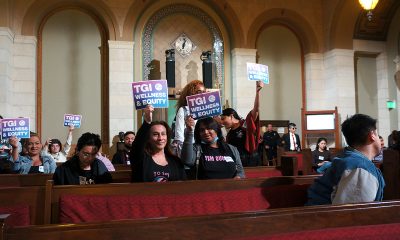
 Los Angeles3 days ago
Los Angeles3 days agoCommunity members urge city council to invest in trans lives
-

 a&e features3 days ago
a&e features3 days agoAlexander Skarsgård describes ‘Pillion’ in 3 words: lube, sweat, leather
-

 a&e features4 days ago
a&e features4 days ago“I just kept showing up”: Broadway veteran Marc Shaiman reflects on musical success stories
-

 Movies4 days ago
Movies4 days agoVan Sant returns with gripping ‘Dead Man’s Wire’
-

 Obituary2 days ago
Obituary2 days agoCatherine O’Hara, ‘Schitt’s Creek’ star and celebrated queer ally, dies at 71
-

 Features1 day ago
Features1 day agoLGBTQ+ legal hero Jon Davidson hands civil rights torch to new generation
-

 Film1 day ago
Film1 day agoRevolutionary lesbian film “Rafiki” secures victory in fight against censorship in Kenya
-

 Television4 hours ago
Television4 hours agoSay ‘Hello, Hello, Hello’ to ‘Drag Race’ winner Onya Nurve
-

 Commentary4 hours ago
Commentary4 hours agoAre we addicted to yearning?






